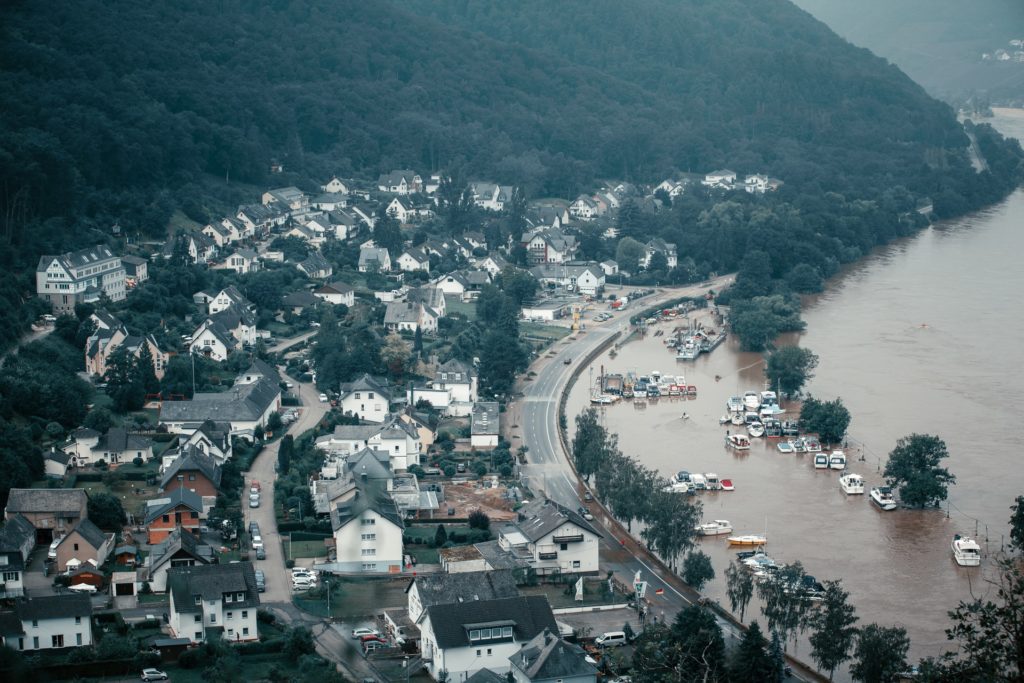Water Everywhere: How Did Germany Get Flooded? Posted by Sten on Jul 28, 2021 in Environment, Language, News, Politics, Vocabulary
It all started as regular schlechtes Wetter (n, bad weather), but Tief Bernd (n, depression Bernd) just wouldn’t move. Regenerating the Regenwolken (f, rain clouds) with water from the Mittelmeer (n, Mediterranean Sea) and the Atlantik (m, Atlantic Ocean). The Regen (m, rain) just wouldn’t stop, and . It was der perfekte Sturm (the perfect storm).
Together Against the Flood
The Regen turned into Flut (f, flood). Straßen (f, roads) became impassable, Keller (m, basements) were unter Wasser (submerged) in no time. Die Feuerwehr (fire department) is in Dauereinsatz (m, continuous operation), they can’t deal with all the Notrufe (m, emergency calls).
It all started in the east, in the Erzgebirge and the north of Bayern (Bavaria). A bit later, Bernd starts pouring down in the west of Germany, more than 300 kilometers away. In the Ruhrgebiet (Ruhr area), the Eifel and das Sauerland. In the city Hagen, the worst Regenfälle (m, rainfalls) ever were reported. They had never seen something like this.
Small Flüsse (m, rivers) that normally nobody even knows about now grow into dangerous streams that destroy everything in their path. Entire towns are flooded, homes are decimated. While most people can evacuate and stay safe, some can’t make it in time.
In Erfstadt-Blessem, in Nordrhein-Westfalen (North-Rhine Westphalia), a Kiesgrube (f, gravel quarry) became so inundated that it pulled down the land around it, creating a veritable Kraterlandschaft (crater landscape). Häuser (n, houses), Autos (n, cars), even the Weizenfelder (n, wheat fields) were washed away.
But there was hope as well. Millions donated things they could spare, groceries, or money to organisations that helped those in need. Thousands helped with the Trümmerbeseitigung (debris removal). It shows that in such times of need, people are there for each other.
Musste es so kommen?
An incredible, unbelievable Katastrophe (f, catastrophe) that seems like a once-in-a-lifetime event. However, der Klimawandel (climate change) is responsible for more extreme weather events like these. With a heating north pole, the jet stream slows down, and therefore also does not pull a Tief like Bernd away as quickly. The consequence is almost stagnant rain clouds that don’t stop pouring down. So these kinds of events may become more frequent, and this could happen again.
But there’s more that’s at play. Many wonder: Musste es so kommen? (Did it have to be this way?) And many say: Natürlich nicht! (of course not!) There is talk of monumentales Systemversagen (n, monumental system failure) on part of the authorities. In the Federal system of Germany, there is Delegation (f, delegation) of responsibilities to lower levels; so where in the chain it went wrong, is hard to say. One thing is certain: There is a resurgence of Alarmsirenen (f, alarm sirens), which were built after the Second World War in case of a nuclear attack. While they were dismantled in recent decades to be replaced with other systems, such as Warn-Apps (f, warning apps), those may not be effective with people that don’t (frequently) use a smartphone. Plus, sending out Warnungen (f, warnings) when the electricity and mobile network are down is not going to work. So Alarmsirenen may be a good first step.

Build vocabulary, practice pronunciation, and more with Transparent Language Online. Available anytime, anywhere, on any device.





Comments:
Constance Brown:
I enjoy both the Dutch and German language blogs! I have good intentions of studying but seldom do; the blogs keep me thinking about the languages, at least. I love that they’re about culture and language both—as is all language study, of course.
Keep writing!